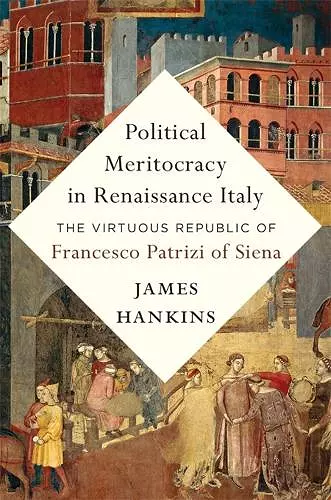Political Meritocracy in Renaissance Italy
The Virtuous Republic of Francesco Patrizi of Siena
Format:Hardback
Publisher:Harvard University Press
Published:28th Apr '23
Should be back in stock very soon

The first full-length study of Francesco Patrizi—the most important political philosopher of the Italian Renaissance before Machiavelli—who sought to reconcile conflicting claims of liberty and equality in the service of good governance.
At the heart of the Italian Renaissance was a longing to recapture the wisdom and virtue of Greece and Rome. But how could this be done? A new school of social reformers concluded that the best way to revitalize corrupt institutions was to promote an ambitious new form of political meritocracy aimed at nurturing virtuous citizens and political leaders.
The greatest thinker in this tradition of virtue politics was Francesco Patrizi of Siena, a humanist philosopher whose writings were once as famous as Machiavelli’s. Patrizi wrote two major works: On Founding Republics, addressing the enduring question of how to reconcile republican liberty with the principle of merit; and On Kingship and the Education of Kings, which lays out a detailed program of education designed to instill the qualities necessary for political leadership—above all, practical wisdom and sound character.
The first full-length study of Patrizi’s life and thought in any language, Political Meritocracy in Renaissance Italy argues that Patrizi is a thinker with profound lessons for our time. A pioneering advocate of universal literacy who believed urban planning could help shape civic values, he concluded that limiting the political power of the wealthy, protecting the poor from debt slavery, and reducing the political independence of the clergy were essential to a functioning society. These ideas were radical in his day. Far more than an exemplar of his time, Patrizi deserves to rank alongside the great political thinkers of the Renaissance: Machiavelli, Thomas More, and Jean Bodin.
We can all benefit from seeing Patrizi restored to his proper place in the history of ideas, as this deeply scholarly and splendidly readable study succeeds in doing. -- Noel Malcolm * Times Literary Supplement *
Patrizi had lots of interesting ideas…Hankins is an eloquent guide to all of them. But he is occupied most of all with Patrizi’s argument for political meritocracy. For Hankins, the idea of meritocratic power is woven through humanist virtue politics, which held that everyone was equal in their capacity to become virtuous through a liberal education. If virtue can be learned, then even the humblest members of civil society can become rulers by acquiring it. Indeed, there was no other route to the legitimate exercise of power than the acquisition of virtue. * New York Review of Books *
Hankins returns us to the Renaissance in order to explore the fate of political meritocracy…[He is] a time traveler, a navigator among languages, and a comparatist who combines exquisite breadth and peerless depth. -- Lee Oser * Law & Liberty *
I’d like to believe that four years reading Thucydides, Plato and Euripides makes my students better citizens and more virtuous people…I am hoping for therapeutic reassurance from James Hankins’s Political Meritocracy in Renaissance Italy, a study of the neglected humanist thinker Francesco Patrizi, an early proponent of republican equality grounded in mass public virtue—instilled, obviously, through the study of Classics. -- Peter Thonemann * Times Literary Supplement *
Required reading for anyone interested in political thought from the late Middle Ages. * Medievalists.net *
A Herculean effort…Hankins provides a qualified but much needed road map for human flourishing. -- Jesse Russell * University Bookman *
Through meticulous scholarship and forceful argumentation, James Hankins restores Francesco Patrizi to his rightful place among leading Italian humanists such as Petrarch and Machiavelli, and also among giants of pan-European humanists such as Thomas More. A tour de force in intellectual history and political theory. -- John P. McCormick, author of Reading Machiavelli
In this remarkable book James Hankins argues that Francesco Patrizi, an all-but-forgotten fifteenth-century humanist, was one of the most important thinkers of his era, up there with Machiavelli. He was a committed and sophisticated meritocrat who provided both a philosophical defense of the meritocratic principle and a detailed blueprint of how to turn that principle into practice. One of Patrizi’s admirers praised ‘not only the gravity and majesty of the argument but the writer’s brilliant mind, learning, and elegance.’ The same can be said of Hankins’s book. -- Adrian Wooldridge, author of The Aristocracy of Talent: How Meritocracy Made the Modern World
James Hankins shows that humanist political thought signaled an important shift from a concept of legitimacy founded on the sources of power to one based on merit and virtue. In fifteenth-century Italy, governments increasingly grounded their claim to rule on the virtue of their rulers—whether monarchs or republican civic leaders—rather than on divine approval, heredity, popular election, or law. He shows that the Sienese humanist Francesco Patrizi—unjustifiably neglected in modern histories of political thought—was the most profound and exhaustive advocate of this new meritocratic approach to politics. Political Meritocracy in Renaissance Italy is an absolute must-read for all students and teachers of political thought, and for anyone interested in Renaissance politics and intellectual history. -- Robert Black, author of Machiavelli and Machiavelli: From Radical to Reactionary
- Short-listed for Helen and Howard R. Marraro Prize 2024 (United States)
ISBN: 9780674274709
Dimensions: 235mm x 156mm x 33mm
Weight: 771g
448 pages